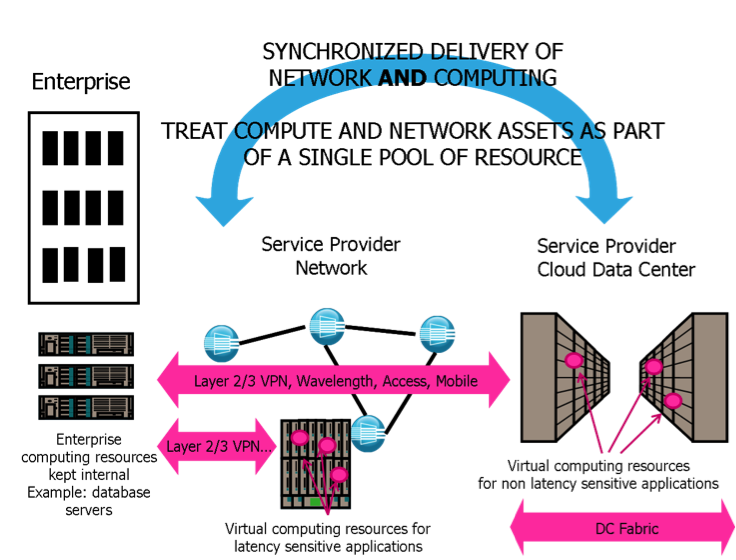Difference between revisions of "Template:Article of the week"
Shawndouglas (talk | contribs) (Updated article of the week text.) |
Shawndouglas (talk | contribs) (Updated article of the week text.) |
||
| Line 1: | Line 1: | ||
<div style="float: left; margin: 0.5em 0.9em 0.4em 0em;">[[File: | <div style="float: left; margin: 0.5em 0.9em 0.4em 0em;">[[File:CarrierCloud.png|180px]]</div> | ||
'''[[ | '''[[Carrier cloud]]''' is class of [[cloud computing]] service that merges the high-performance capabilities and reliability of a communications service provider's network with the lower costs and flexibility provided by traditional public cloud services. The carrier cloud attempts to remove the data bottleneck and security issues that often occur in and to the virtualized data center due to lack of control of data flow over the public Internet. | ||
Carrier cloud service is similar to public cloud service in that infrastructures are converged into a single, optimized computing package, and services are shared across a group or organization. Carrier cloud service, however, utilizes the existing and upgraded network structures of the communication service provider (CSP) to provide end-to-end services over their own network. Since the CSP more readily controls the data flow through its content delivery networks and/or dedicated virtual private networks, it can better manage issues with bandwidth, latency, and jitter. Additional "last mile" carrier-grade services already provided by CSPs in cities also "offset the latencies associated with cross-country or inter-continental backhaul." ('''[[Carrier cloud|Full article...]]''')<br /> | |||
<br /> | <br /> | ||
''Recently featured'': [[International Electrotechnical Commission]], [[Physician office laboratory | ''Recently featured'': [[Forest informatics]], [[International Electrotechnical Commission]], [[Physician office laboratory]] | ||
Revision as of 16:25, 14 October 2014
Carrier cloud is class of cloud computing service that merges the high-performance capabilities and reliability of a communications service provider's network with the lower costs and flexibility provided by traditional public cloud services. The carrier cloud attempts to remove the data bottleneck and security issues that often occur in and to the virtualized data center due to lack of control of data flow over the public Internet.
Carrier cloud service is similar to public cloud service in that infrastructures are converged into a single, optimized computing package, and services are shared across a group or organization. Carrier cloud service, however, utilizes the existing and upgraded network structures of the communication service provider (CSP) to provide end-to-end services over their own network. Since the CSP more readily controls the data flow through its content delivery networks and/or dedicated virtual private networks, it can better manage issues with bandwidth, latency, and jitter. Additional "last mile" carrier-grade services already provided by CSPs in cities also "offset the latencies associated with cross-country or inter-continental backhaul." (Full article...)
Recently featured: Forest informatics, International Electrotechnical Commission, Physician office laboratory










